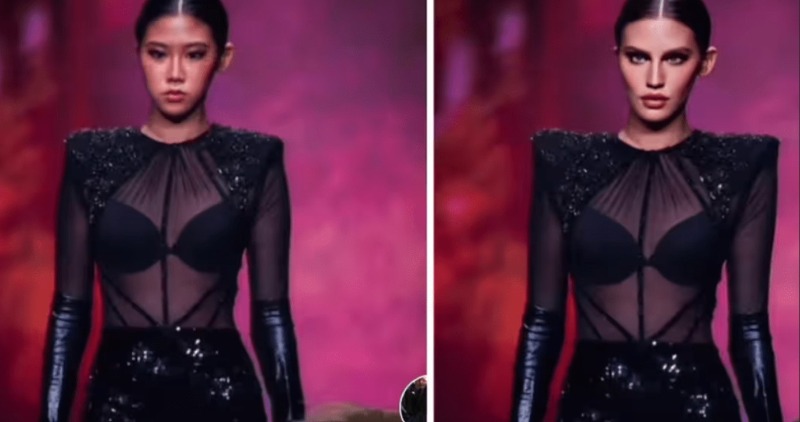In a captivating turn of events, model Shereen Wu, with roots in Taiwan and the United States, has sparked a heated discussion in the fashion world. The controversy centers around a digitally manipulated image that was posted by acclaimed fashion designer Michael Costello, known for his collaborations with celebrities like Beyoncé, Jennifer Lopez, and Celine Dion. Wu, in a viral TikTok video that amassed 1.8 million views within a week, alleges that a photo from a Los Angeles fashion show was altered using artificial intelligence to make her appear Caucasian.

The video, a poignant __EXPRESSION__ of Wu's dismay, depicts her strutting down the runway, only to have her face unrecognizably altered. This shocking change, she claims, is a stark deviation from her Asian heritage. The fashion designer, in a now-deleted Instagram statement, denied personally editing the image, attributing it to "fun art" from an anonymous source. Despite this, he accepted responsibility for sharing the photo, citing an emotional state and a lack of foresight.
Wu's situation is further complicated by her status as a freelance model, reliant on sporadic gigs for her livelihood. She expressed her disappointment at not being compensated for the Art Hearts fashion week show, emphasizing the loss of recognition for not only herself but also the makeup artist, hairstylist, and photographer involved. The emotional impact was profound, with Wu describing her initial shock and sadness, especially considering her mother's reaction to the altered image.
Costello, in response to Wu's allegations, announced his intention to pursue legal action, claiming ignorance of Wu's lack of compensation until her TikTok revelation. He offered her remuneration post-discovery and lamented receiving death threats over the incident, which he described as a tribute to his late aunt.
Erik Rosete, president of Art Hearts, shed light on the logistical challenges of compensating models for shows featuring numerous designers, hinting at the financial constraints faced by the organization.
This episode underscores a broader ethical dilemma in the fashion industry concerning the use of artificial intelligence. The technology, while innovative, has raised concerns about perpetuating racial and gender biases. The fashion world, already scrutinized for digitally altering models' bodies, as exemplified by Filippa Hamilton's outcry against Ralph Lauren in 2009, now grapples with the implications of AI in image manipulation.
Initiatives like Levi's decision to use computer-generated models of diverse ethnicities on its website have sparked debate. Critics argue that genuine inclusivity would entail hiring real models from varied backgrounds rather than relying on digital representations.
Wu's experience, which led her to seek legal counsel through the Model Alliance, an advocacy group for fashion workers, highlights a persistent issue in the industry. The unauthorized or uncompensated use of models' images, as Sara Ziff of Model Alliance points out, is a longstanding problem, now exacerbated by the advent of AI technology.
In conclusion, this unfolding drama not only sheds light on the challenges models face in protecting their image and rights but also prompts a critical examination of the ethical boundaries of artificial intelligence in the creative industries.
